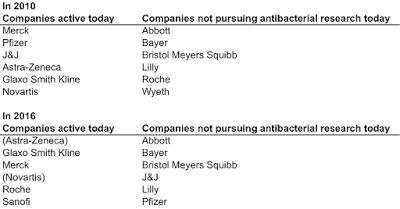Today I went back to the book I wrote back in 2010 -- "Antibiotics: The Perfect Storm."
In that book I had a table showing the number of large pharmaceutical companies (>$10B in revenues) pursuing antibiotic R&D and those who were not.
I then updated that table as it stands today. It is shown below.
Guess what! The names have shifted, but the numbers are the same.
Since I wrote the book, Pfizer and J&J dumped its antibiotics research programs, but Roche and Sanofi each restarted its own. I put AstraZeneca and Novartis in parentheses this time since AZ recently spun out their discovery group and is now entirely a development organization while Novartis remains schizophrenic (as far as I can tell).
Novartis has an active and dedicated antibacterial research group, but a hesitant development and commercial group (unless something has dramatically changed recently). The players who have returned to the field since 2010, Roche and Sanofi, have yet to produce anything truly promising. Also, I guess I should add a number of companies to the list. Gilead had $29 billion in revenue in 2014, but remains a highly specialized company focusing mainly on antivirals. There may be other companies that I should have added as well some of you will know this better than me.
In late January at the Davos conference, a group of pharmaceutical and diagnostic companies released a declaration supporting incentives for antibiotic R&D. In going down the list of signatories, the only large companies not pursuing antibiotic R&D that signed were J&J and Pfizer. Abbot, Bayer, BMS, Lilly, (Gilead), were nowhere to be seen.
As I noted recently for the New York Times the question is: Even if the incentives were to
appear such that a return on investment for antibiotics was guaranteed, would some of these companies get back in the game?
The absence of signatures may tell the story. Why? Once you have abandoned a field of research, you lose all internal expertise in that field. Getting back in is hard and takes years. Just ask Roche and Sanofi. Some of these companies probably feel comfortable where they are and have no desire to get back to antibiotic R&D, even if there could be a return on their investment.
The story with Pfizer may or may not be different. I noted in November that they are pursuing a purchase of Allergan. Allergan has the U.S. rights to the promising
AZ pipeline of antibiotics for resistant Gram negative infections and is already marketing ceftazidime-avibactam (Aycaz). This means that Pfizer would have an opportunity to get back in.
Will they take it? Is that what their signature means? Will incentives help them decide? Who knows?
I leave the question as to whether we have made progress since 2010 or not up to you.

This article originally appeared at Antibiotics - The Perfect Storm




